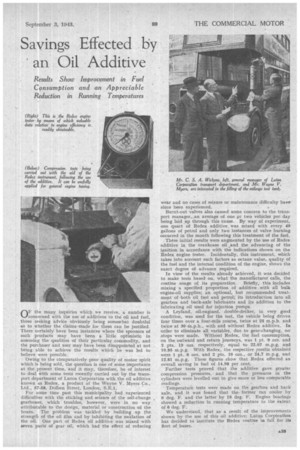Savings Effected by an Oil Additive
Page 35

If you've noticed an error in this article please click here to report it so we can fix it.
Results Show Improvement in Fuel Consumption and an Appreciable Reduction in Running Temperatures
rAF the many inquiries which we receive, a nunaber is ‘,../concerned with the use of additives to the oil and fuel, those seeking advice obViously being somewhat doubtful as to whether the claims-made for them can be justified. There certainly have been instances where the sponsors of such products may have been a little optimistic in assessing the qualities -of their particular commodity, and the purchaser and user may have been disappointed at not being able to achieve the results which he was led to believe were •possible.
Owing to the cOmparatively poor quality of motor spirit which is being sold, the question is one of some importance at the. present time, and it may, therefore, be of interest todeal with some tests recently carried out by the transport department of Luton Corporation with the oil additive known as Redex, a product of the Wayne V. Myers Co.,
Ltd., 57-58, Dolben Street, London, S.E.I. • • For some time past this municipality had experienced difficulties with the sticking and seizure of the self-change gearboxes, which troubles, however, were in no way attributable to the design, material or construction of the boxes. The problem was tackled by building up the. strength of the oil film and by inhibiting the oxidation of the oil. One part of Redex oil additive was mixed with seven parts of gear oil, which had the effect of reducing wear and no cases of seizure or maintenance difficulty have. since been experienced.
Burnt-out, valves also caused some concern to the transport manager,-.an average of one or two vehicles per. day being laid .up through this cause. By way of experiment, one quart Of Redex additive was mixed with every 40 gallons of petrol and only two instances of valve burning occurred in the month following this treatment of the fuel.
Thae initial results were e by the use of Redex additive in the crankcase oi and the advancing of the ignition in accordance with the indications shown on the Redex engine tester. Incidentally, this instrument, which takes into account such factors as octane valuer quality of the fuel and the internal condition of the engine, shows the exact degree of• advance required.
In view of the results already achieved, it was decided to make testS based on, what the atanuficturor calls, the
routine usage, of its preparation. Briefly, this includes mixing a specified proportion of additive with all bulk engine-oil supplies; an optional, but recommended treatment of both oil fuel and petrol; its introduction into all gearbox and back-axle lubricants and its addition to the lubricating oil, used for injection pumps.
A Leyland, oil-engined, double-decker,. in very good condition, was used for the test, the vehicle being driven four times over a four-mile course, twice at 25 re.p.h, and twice at 30-m.p.h., with and without Redex additive. In order to eliminate all variables, due to gear-changing, no stops were made. Without Redex, the fuel consumption, on the outward and return journeys, was 1 pt. -9 ozs. and 2 pts. 19 ozs, respectively, equal to 22,07 m.p.g. and -10.85 m.p.g. With Redex, the respective results obtained were 1 pt. 6 ozs. and 2 pts. 10 ozs., or 24.7 m.p.g. and 12.81 m.p.g. These figures show that Redex effected an overall saving in fuel. of 14.98 per cent.
• Further tests proved that the additive gave greater compression pressures, and that the pressures in the cylinders were levelled out to give more or less comparable readings. Temperature tests were made on the gearbox and back axle, and it was found that the' former ran cooler by 6 deg. F. and the latter by 10 deg, F. Engine bearings showed a reduction in running temperature to the extent of 6 deg. F. We understand, that as a result of the improvements shown by the use of this oil additive; Luton Corporation has decided to institute the Redex routine in full for its fleet of buses.




















































